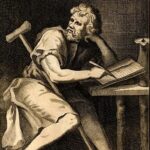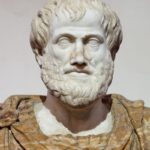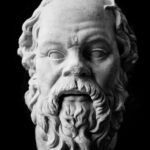Beethoven was an emotional man. What else should the father of romantic musical era be? Stopping a piano concert, calling a disrespectful audience pigs and leaving was as common as throwing chairs or books at fellow human beings. He knew he had problems and was working on it… as today we call the process.
Who was Plutarch?
Plutarch was a Greek philosopher, priest, biographer and essayist who lived in the 1st and 2nd century AD. He was born in Chaeronea, Boeotia, Greece in the year 46 AD and died around 120 AD. Plutarch is best known for his Parallel Lives, a series of biographies comparing famous Greeks and Romans. The work pairs up famous figures such as Alexander the Great and Julius Caesar, and compares their lives and accomplishments. Plutarch was also a prolific writer of essays, covering a wide range of topics including ethics, religion, and politics. His works were highly regarded in antiquity and continue to be studied and admired today for their insights into the lives and times of the people he wrote about.
His work on ethics, the Moralia, is notable for its philosophical and ethical discussions, as well as for its insights into ancient Greek and Roman culture. Plutarch’s writing style is highly engaging and accessible, making the Moralia a popular work both in antiquity and today.
Plutarch and other contemporary thinkers on anger
We know Beethoven read both Epictetus and Plutarch, as he tried to noble his soul. In a letter in 1804 he wrote, “Plutarch helps me with restraining my passions.” How did he help and what did Plutarch think about emotions and anger in particular?
In the ancient world philosophers often disagreed on what to do with anger. For Aristotle it could be a useful emotion to undertake certain actions that requires extraordinary inner strengths. For Stoics it was not acceptable, as the perfect philosopher is invulnerable to provocation. Seneca, for example, considered anger as a surrender to an internal force and giving up reason. Such anger driven person is no longer free.
Plutarch was somewhere in the middle. He accepted Aristotle’s view that sometimes, if such emotions are controlled by reason, are welcome. One example he set was the righteous indignation, like anger felt over witnessing an evil act. Not so the detrimental form of anger. Here, Plutarch uses the example of abused servants and slaves. “The only music heard within the house of an angry man is wailing
cries.” – quotes Plutarch from a Greek tragedy. This kind of anger has no righteous element in it and as such must be eliminated.
He was against, even if necessary or justified, excessive anger. He points to the Spartans for good example saying, “The Spartans use the playing of pipes to remove from their fighting men the spirit of anger, and they sacrifice to the Muses before battle in order that reason may remain constant within
them.”
He also observed, that anger, after it overtakes our emotions, shuts down reason and alters our physical appearance, too. One should look into the mirror when furious to confirm his view!
How to heal anger? There is cure, according to Plutarch, but it is a long process, because when it (anger) appears it listens to nothing. As a first step one should observe anger in others. How it looks? How does it work? How it goes away? What damages it lefts behind?
Next step is control, both in words and actions. Use reason to overcome anger! One should make that famous counting to ten a habit, before any action! Best way to start here is with servants, he recommends, to be able to isolate anger from other emotions, like envy or rivalry. Things a master is unlikely to feel towards those under his or her command.
Finally, angry man must slow down, cultivate gentleness and cheerfulness, soft speech and always remember that we all are limited and imperfect! Real courage is not to be found in harsh actions, but in gentleness.
Controlling anger is not coming from a one time act or short term treatment. It is a life-long commitment and practice of reason. As Plutarch says, “The power of reason is not like drugs, but like wholesome food, engendering an excellent state, together with great vigor, in those who become accustomed to it.”
How much help Plutarch was for Beethoven, we do not know with a good level of certainty. From recollections we may have the impression, that even in his last years he was rather emotional and often erratic. Being deaf as a musician, feeling alone and locked in silence is miserable, one can feel irritated more easily. At least he tried!






